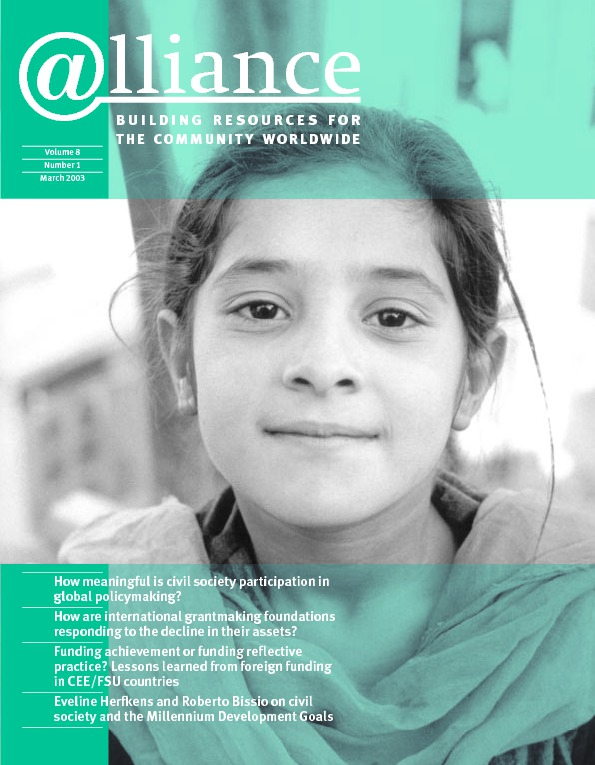The onset of the 21st century will surely be looked back on as an era when we went from being locally identifiable individuals and communities to being global citizens in a world where everything resembles everything, from downtown New York to Buenos Aires, Paris, Sydney or Beijing. Around the world, people are flocking to the convenience of having Starbucks coffee within arm’s reach.
The fear that this global wave is wiping out local identity, customs, tradition and even history has led to a recent globalization of anti-globalization, an undefined, uncentralized but very present movement manifesting itself on the streets, in music, videos, literature, and social and political discourse. Two recently published volumes by Walden Bello and a number of other renowned opponents to free market globalization – sometimes called ‘globaphobes’ – offer recipes for saving the world from this McDonaldization of cultural diversity.
Both give a poignant critique of globalization forces. The authors examine World Bank and IMF policy, corporate dynamics, and public decision-making, which the authors claim no longer take into account basic human needs. The present global neoliberal regime is grounded in free trade and free markets, and the promise to create prosperity for all in fact remains out of reach for most. In the end, the system fights for its own, self-centred perpetuation. The authors see a world comprising greedy corporate globalists who regard corporations as ‘the greatest and most efficient human institutions, powerful engines of innovation and wealth creation’. Corporate globalists are juxtaposed with ‘citizen movements, focused on people and the environment’. The authors see corporations ‘replacing democracies of people with democracies of money, replacing self-organizing markets with centrally planned corporate economies, and replacing diverse cultures with cultures of greed and materialism’.
Growing civil society resentment is leading to pressure for the dismantling of the current global system. The assumption is that all sectors will necessarily benefit from expanding markets and economies through some inherent trickle-down system, but trickle-down economics does not work. Whereas in the past the ‘public good’ had distinct meaning, and there existed a universal objective of securing a basic quality of life for everyone, which was in a sense a global understanding of the place of people on the planet, globalization has altered all this. Government is retrenching and looking to the market to guarantee social well-being, an unlikely formula.
What do we do about this? Do we aim to reverse technology and global forces? Recalling the motto of the 2002World Social Forum in Porto Alegre, Brazil, which brought together thousands of anti-globalists, Bello claims that ‘a new world is possible’. Both volumes offer a take-it-or-leave-it dichotomy: you either fix from within or dismantle and begin all over again – the path most of the authors seem to prefer.
Suggestions range from transforming the IMF into a think-tank with no teeth, putting an end to World Bank lending, and dismantling the World Trade Organization. While the globaphobes’ vision seems oversimplistic at times, it underlines the central problem we do face as an increasingly unjust society where resources are continuously shifting north and where the dynamics of corporate-led forums such as the WTO dominate the development agenda.
Our institutions, local and international are failing to attend to our basic needs. The time has come, the authors suggest, ‘to create democratic institutions of global governance that will end corporate rule, secure the human rights and democratic sovereignty of people everywhere, and restore control of national economies and resources to their own governments.’
This us-versus-them depiction of global society removes the problem from the real-life context in which we live, in which, good or bad, the system is a product of a massive social process. As actors in this process, we have all set up a flawed value system, creating both heroes and marginalized losers. Equity has not been central to this system. In the end, globalization is merely the extension to a global stage of the local dynamics of human nature, which tend to be quite similar around the world. Poverty and inequality have always existed. The difference is that today the rich are part of a globalized elite buying the same golf clubs and driving the same Sport Utility Vehicles, while the lives of the poor are very similar whether they live on a garbage pile in Manila or in a shantytown in Rio de Janeiro. What we need to transform is not the institutions of globalization but human nature itself, a far more daunting task.
Might it be that in the end, no matter how we organize our society, there will always be corporate globalists and social globalists among us? In this respect, I recall one of Martin Kohr’s alternatives (he is a contributor to Alternatives), namely to change the system so as to prioritize the concerns of the latter rather than of the former. What we need is a change of heart and will, individually and socially, not one of structures or systems. Without the former, the latter will never resolve the inherent human problems we seem always to face.
Jorge Daniel Taillant is Executive Director of the Center for Human Rights and Environment, Cordoba, Argentina. He can be contacted at daniel@cedha.org.ar
Deglobalization: Ideas for a new world economy
Walden Bello Zed Books £9.99/$17.50 (paperback)
To order Deglobalization, visit http://www.zedbooks.demon.co.uk or http://www.palgrave-usa.com
Alternatives to Economic Globalization: A better world is possible
John Cavanagh, Jerry Mander et al (eds) International Forum on Globalization/ Berrett Koehler Publishers $15.95
To order Alternatives to Economic Globalization, visit http://www.bkpub.com






Comments (0)